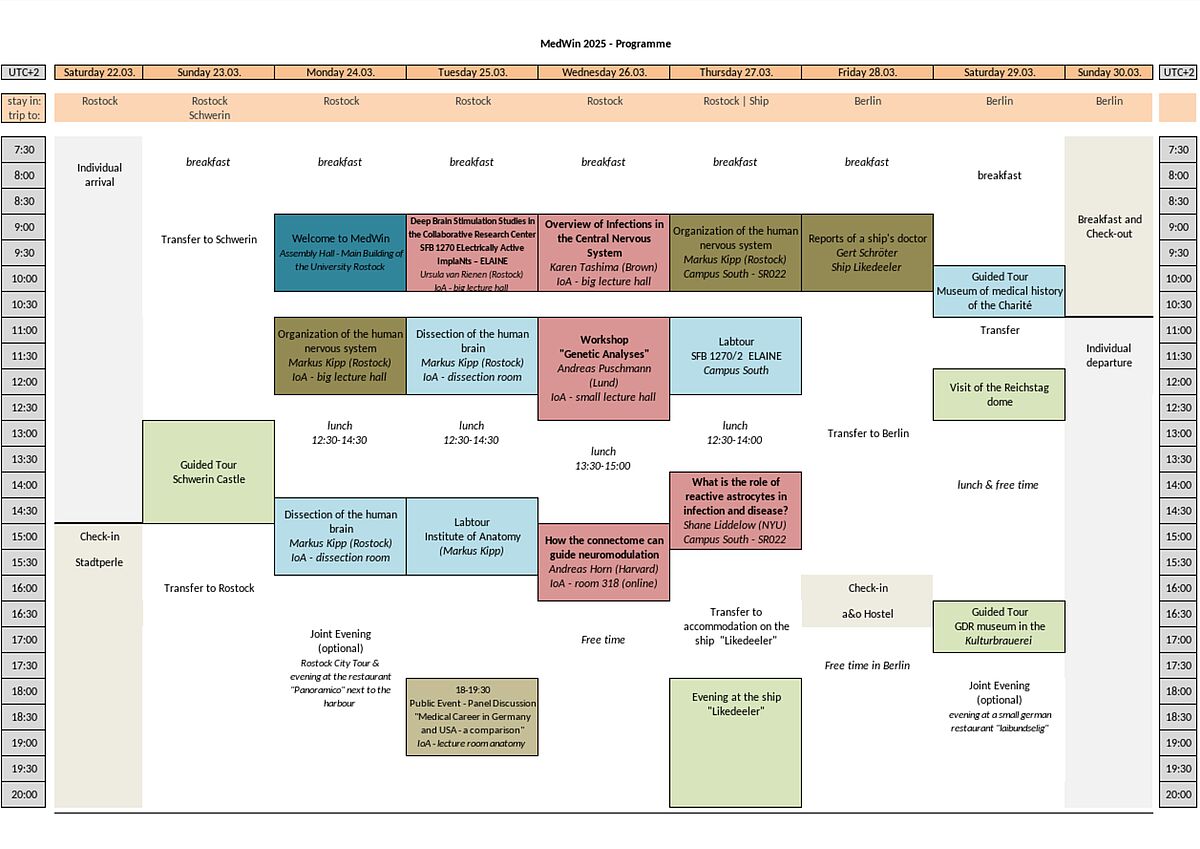MedWin 2025 Program
From macroscopy to histology: organization of the central nervous system
A diverse program awaits the participants. At the heart of the Winter School is the dissection of human brains and the assessment of the brain's histological structure. These learning units are complemented by lectures and discussions on highly relevant neurological diseases. First there will be a lecture by Ursula van Rienen about Electrically Active implants, followed by Karen Tashima focusing on infections in the Central Nervous System, a „Genetic Analyses“ Workshop with Andreas Puschmann, a lecture about connectomes with Andreas Horn and last but not least a keynote lecture with Shane Liddelow about reactive astrocytes.
The Winter School is a chance to meet these experts in their fields and discuss future visions with them. The event week is rounded off with a visit to the capital city, Berlin, as well as an unforgettable night at the Rostock boat hotel "Likedeeler”.
The lectures
Deep Brain Stimulation Studies in the Collaborative Research Center SFB 1270 ELectrically Active ImplaNts – ELAINE
Prof. Dr. Ursula van Rienen
This presentation will commence with an overview of select findings from ELAINE projects concerning deep brain stimulation. Subsequently, it will address multiscale modeling methodologies for precise electric field distribution in targeted brain regions, the concept of pathway activation models, and the utility of biophysical neural networks in elucidating the mechanisms of action of deep brain stimulation in the motor cortex.
Overview of Infections in the Central Nervous System
Dr. Karen Tashima
The objective of the talk will be to give an overview of infections that occur in the CNS. We will discuss routes of infection, diagnosis, treatment and prognosis. We will discuss predisposing conditions for the infections such as genetic susceptibility, immunocompromise from HIV or other underlying medical conditions, and environmental risks.
Workshop: Genetic Analysis - How to diagnose genetic disorders
Andreas Puschmann, PhD, Associate Professor
This workshop starts with an introductory lecture on principles of genetics and on approaches to genetic diagnostics in current neurological practice. In small groups, participants then analyse movement disorder patient cases provided in electronic format. Participants learn to identify the clinical phenomenology and to evaluate a genetic test result. The groups then present their cases and reflections to the entire class. Participants need to have a laptop computer with internet access during this workshop.
Co-presenters:
Bioinformatician/medical geneticist Efthymia Kafantari and Joel Wallenius (Lund, Sweden) will be available during the workshop to guide participants through genetic databases.
How the connectome can guide neuromodulation
Andreas Horn, MD, PhD, Associate Professor
In recent years, large initiatives around the globe have accumulated data used to calculate average wiring diagrams of the human brain. In this talk I will discuss how these “connectomes” can guide invasive and noninvasive neuromodulation in healthy and clinical populations. These concepts have direct clinical value for treating Parkinson’s & Alzheimer’s Disease, Obsessive Compulsive Disorder or Depression. I will review methods and results from multiple studies that research labs world wide have applied to study connectomic effects of focal neuromodulation. We will cover results in diseases ranging from the movement disorders spectrum (Parkinson’s Disease, Dystonia, Essential Tremor) to neuropsychiatric (Tourette’s & Alzheimer’s Disease) and psychiatric (Obsessive Compulsive Disorder, Depression) diseases but also focus on findings from stroke patients and healthy subjects. I will demonstrate how findings in seemingly different diseases (such as Parkinson’s Disease and Depression) could be transferred to cross-inform one another and give a path forward to establish connectome-based neuromodulation.
What is the role of reactive astrocytes in infection and disease?
Shane Liddelow, PhD, Associate Professor
Reactive astrocytes exhibit significant heterogeneity in response to acute infection and trauma and during chronic neurodegenerative diseases, influencing progression of pathology and therapeutic outcomes. This talk will explore the diverse roles of reactive astrocytes in the central nervous system, highlighting recent findings on their phenotypic and functional heterogeneity. We will discuss how specific subtypes of reactive astrocytes contribute to the pathology of neurodegenerative diseases such as Alzheimer’s, glaucoma, and stroke. By understanding the molecular mechanisms driving astrocyte reactivity, we can identify novel therapeutic targets. This presentation will also cover strategies to selectively modulate reactive astrocyte subtypes, aiming to mitigate their detrimental effects while enhancing their neuroprotective functions. Our goal is to pave the way for innovative treatments that leverage astrocyte biology to combat neurodegenerative diseases effectively.



